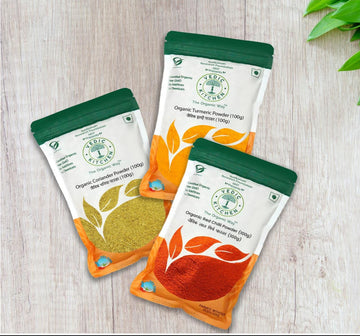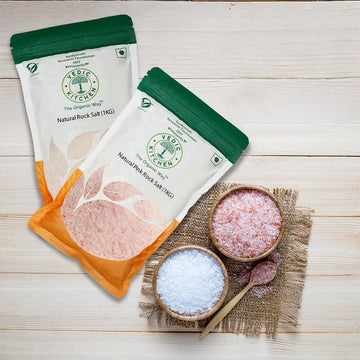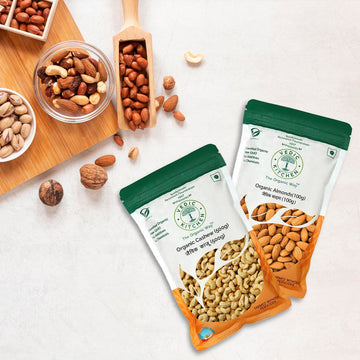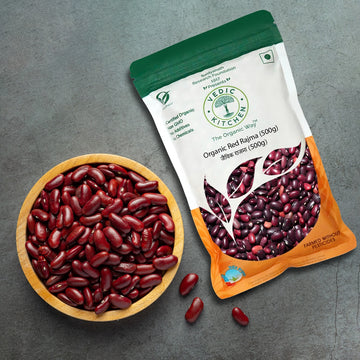From Seed to Spice Rack: Organic Spices Undergo a Captivating Journey
by Sandeep kumar on Aug 15, 2024

Did you ever think of a thought of what magic journey spices undertake before they hit your kitchen? A cautious harvesting, sun-drying, and dedication to organic—something of the sort must be the history of spices more so Organic Spices.
Definition of Spices
Spices are natural products extracted from plants, seeds, or roots, and they are mainly used to flavour and give taste to food. They often bring out typical smells, tastes, and colours and therefore find very broad uses in many cuisines around the world.
Growing Demand for Organic Spices
As a result of consumers developing an interest in taking chemical-free meals, the demand for organic spices has increased. Heightened health concerns, environmental conscience, and the urge to taste innovative and sumptuous foods are major drivers behind this increase.
The Journey of Organic Spices from Seed to Spice Rack
An organic spice starts off as a seed, tended lovingly to be nourished by the sun. Once harvested, so many spices are dried and processed, sometimes by hand, to bring out their flavour. Then they start their long journey to end up in your spice cabinet, all set to give your food a whole different taste.
Organic versus conventional spices difference
Organic Spices
- No Synthetic Chemicals: Organic spices manufactured without using artificial fertilisers, pesticides, and other additives by spraying.
- Natural Techniques: Use compost and other organic fertilisers, and refrain from using synthetic pesticides.
- Processing: One alternative for eliminating microbes is steam sterilisation, which does not involve the use of chemicals.
Conventional Spices
- Conventional Methods: Synthetic fertilisers and pesticides may be used throughout cultivation.
- Possible worries: Pesticide residue in trace concentrations (within regulatory limits) Preservatives can mask flavour.
- Processing: - Often sterilised using chemical techniques such as fumigation
Importance of choosing organic spices for health and sustainability
Differently, choosing organic spices is good for health and sustainability. Organic farming does not use synthetic pesticides and fertilizers, thus reducing chemical exposure to people and creating biodiversity. It maintains better soil quality, water resources, and healthier ecosystems.
Exploring organic spice farming practices
Organic farming of spices conserves and improves natural practices in agriculture, including crop rotation, composting, and biological control of pests and diseases, which enhance soil health and biodiversity.
Sustainable agriculture techniques used in spice cultivation
- Intercropping: This is the growing of a combination of crops in a field at one time.
- Crop rotation: This practice soil health and fertility is improved by simply changing crops at intervals on the same land.
- Cover cropping: The problems of soil erosion, herbaceous weed, and compiling problems of poor soil health are averted by growing cover crops after harvest or in between rows of spice crops.
Popular Organic Spices and Their Growing Regions
- Black Pepper: The king of spices originates from South India, more specifically from the Malabar Coast of Kerala.
- Turmeric: It is replete with health benefits and Turmeric is an elemental part of Indian cuisine, growing regions are Andhra Pradesh, Tamil Nadu, Maharashtra, and Odisha.
- Cumin: India is the largest producer of cumin at present, Uttar Pradesh, Gujarat, and Rajasthan are the main producing regions.
Harvesting Process of Organic Spices
- Knowing the Time for Harvest: When the organic spices are ripe and the flavours and essential oils are fully concentrated, they are harvested differently from commercially farmed spices.
- Hand-harvesting: Organic spices are almost always collected by hand to prevent harm to the plants or the ecosys-tem surrounding them.
- Post-harvest Handling: Organic spices have to be treated gingerly at harvest to maintain their quality and not spoil.
Methods of Processing Organic Spices
- Cleaning & Sorting: Organic Spices are sorted by hand many times to rid them of leaves, twigs, or rubbish.
- Drying: Traditionally, Organic Spices are sun-dried to lock in freshness and avoid spoilage.
- Grinding: Grind them into powders right before use to retain the power of whole spices
Ensuring the Integrity and Taste of Organic Spices During Processing
Organic processing of spices achieves nutritional integrity, attains organic standards, and culinary satisfaction by preserving quality and flavour.
Quality Standards and Certifications
Certifications for Organic Spices (USDA Organic, EU Organic, etc)
- USDA Organic: This is the certification program of the United States Department of Agriculture. The cultivation and processing of spices, in order to be USDA Organic certified, must adhere to these rigorous National Organic Program guidelines.
- EU Organic: This certification is overseen by the European Union and therefore based upon a set of regulations established by the European Commission.
Ensuring Authenticity and Quality in Organic Spices Products
- Traceability Program: Some companies have traceability programs that let you trace the spice from farm to shelf.
- Whole vs. Ground: The whole spices retain flavour and aroma for a longer time than those already ground.
Consumer Sensitivity towards the Need to Check for Certifications in Organic Spices
The consumers should thus check for certifications when buying organic spices since they ascertain that the products have undergone strict organic farming regulations that do not permit the use of synthetic chemicals and genetically modified organisms.
Health Benefits of Organic Spices
Nutritional Value and Medicinal Properties of Organic Spices
The organic spices are not only good in flavouring the food; they are also rich in antioxidants, vitamins and minerals therefore very good for overall health and wellness.
Role of Organic Spices in Boosting Overall Health and Well-being
Organic Spices are inherently dense with high amounts of powerful antioxidants, anti-inflammatory properties, and potent vitamins and minerals; thus, they play a very significant role in enhancing overall health and well-being.
Scientific Evidence Supporting the Health Benefits of Organic Spices Consumption
Although sparse, scientific data favouring health advantages of organic spices is promising. Comparing organics against conventional spices can help save the environment and reduce a person's exposure to pesticides. Like turmeric and cinnamon, which have antiFlavoring properties: Natural spices like paprika, coriander, turmeric and cumin add a unique flavour.
Cooking Applications and Recipes
Versatility of Organic Spices in Cuisine
- Aroma: Many organic spices, such as cardamom, cloves and cinnamon add a pleasant aroma.
- Natural colouring: Spices like turmeric, paprika and saffron add natural colour to food without the use of synthetic food colouring-inflammatory and antioxidant properties.
Traditional and Modern Culinary Uses of Organic Spices
Traditional Culinary Uses
- Medicinal purposes: Historically, many organic spices were utilized for their medicinal properties.
- Cultural Significance: Spices often have cultural significance in traditional foods.
- Rituals and festivals: Spices play a role in rituals and festivals.
Modern Culinary Uses
- Flavour Enhancement: Chefs and home cooks use organic spices to intensify and diversify flavours in modern recipes.
- Health Benefits: There’s a growing awareness of the health benefits of organic spices.
- Sustainability: Organic spices are preferred for their sustainable cultivation practices, which appeal to environmentally conscious consumers.
Recipes Featuring Organic Spices
- Organic Spiced Tandoori Marinade: Combine organic yoghourt, lemon juice, garlic, ginger, and spices. Marinate vegetables. Bake until done.
- Organic Garam Masala Spice Blend: Toast and grind organic cumin, coriander, cardamom, peppercorns, cloves, cinnamon, and nutmeg.
- Organic Chickpea Curry: Simmer organic chickpeas in a blend of organic curry powder, turmeric, and cumin with organic coconut milk and tomatoes.
Sustainable Practices and Environmental Impact
Environmental Benefits of Organic Spices Farming
Growing spices organically increases biodiversity, lowers soil and water pollution from artificial fertilisers and pesticides, and protects natural ecosystems—all of which have a positive impact on the environment. By minimising chemical inputs that may endanger wildlife and pollinators, it promotes healthier ecosystems.
Importance of Supporting Sustainable Spices Production
Maintaining food security, reducing climate change, and protecting biodiversity all depend on supporting sustainable spice production. In addition to supporting farmers' livelihoods, it encourages environmentally sustainable farming methods and lessens chemical contamination in soils and waterways.
Impact of Consumer Choices on the Sustainability of the Spices Industry
The need for ecologically sustainable and ethically sourced products is influenced by consumer choices, which have a huge impact on the sustainability of the spices sector.
Encouragement to Choose Organic Spices for Their Health Benefits and Positive Environmental Impact
Selecting organic spices encourages sustainable farming methods that are good for the environment in addition to improving your health by lowering your exposure to dangerous chemicals and pesticides.
Summary
The voyage of organic spices starts with seeds sown in well-tended soil, where they develop naturally without the use of artificial chemicals. When they reach maturity, they are hand-harvested to maintain their flavour and quality.




